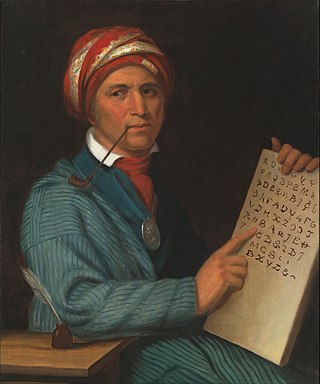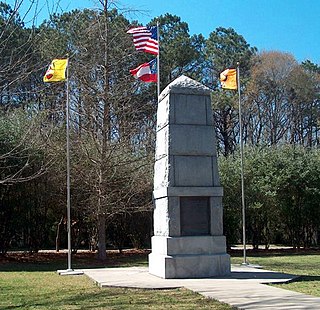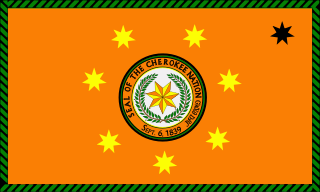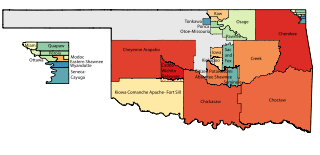
The Cherokee are one of the indigenous peoples of the Southeastern Woodlands of the United States. Prior to the 18th century, they were concentrated in their homelands, in towns along river valleys of what is now southwestern North Carolina, southeastern Tennessee, southwestern Virginia, edges of western South Carolina, northern Georgia and northeastern Alabama.

The Trail of Tears was an ethnic cleansing and forced displacement of approximately 60,000 people of the "Five Civilized Tribes" between 1830 and 1850 by the United States government. As part of the Indian removal, members of the Cherokee, Muscogee (Creek), Seminole, Chickasaw, and Choctaw nations were forcibly removed from their ancestral homelands in the Southeastern United States to newly designated Indian Territory west of the Mississippi River after the passage of the Indian Removal Act in 1830. The Cherokee removal in 1838 was brought on by the discovery of gold near Dahlonega, Georgia, in 1828, resulting in the Georgia Gold Rush.
Worcester v. Georgia, 31 U.S. 515 (1832), was a landmark case in which the United States Supreme Court vacated the conviction of Samuel Worcester and held that the Georgia criminal statute that prohibited non-Native Americans from being present on Native American lands without a license from the state was unconstitutional. The opinion is most famous for its dicta, which laid out the relationship between tribes and the state and federal governments. It is considered to have built the foundations of the doctrine of tribal sovereignty in the United States.

Tribal sovereignty in the United States is the concept of the inherent authority of Indigenous tribes to govern themselves within the borders of the United States.

Indian country is any of the many self-governing Native American/American Indian communities throughout the United States. As a legal category, it includes "all land within the limits of any Indian reservation", "all dependent Indian communities within the borders of the United States", and "all Indian allotments, the Indian titles to which have not been extinguished."

The Treaty of New Echota was a treaty signed on December 29, 1835, in New Echota, Georgia, by officials of the United States government and representatives of a minority Cherokee political faction, the Treaty Party.

The United Keetoowah Band of Cherokee Indians in Oklahoma is a federally recognized tribe of Cherokee Native Americans headquartered in Tahlequah, Oklahoma. According to the UKB website, its members are mostly descendants of "Old Settlers" or "Western Cherokee," those Cherokee who migrated from the Southeast to present-day Arkansas and Oklahoma around 1817. Some reports estimate that Old Settlers began migrating west by 1800. This was before the forced relocation of Cherokee by the United States in the late 1830s under the Indian Removal Act.

The Cherokee Nation, also known as the Cherokee Nation of Oklahoma, is the largest of three Cherokee federally recognized tribes in the United States. It includes people descended from members of the Old Cherokee Nation who relocated, due to increasing pressure, from the Southeast to Indian Territory and Cherokee who were forced to relocate on the Trail of Tears. The tribe also includes descendants of Cherokee Freedmen, Absentee Shawnee, and Natchez Nation. As of 2023, over 450,000 people were enrolled in the Cherokee Nation.

The Georgia land lotteries were an early nineteenth century system of land redistribution in Georgia. Under this system, white male citizens could register for a chance to win lots of land that had been taken from the Muscogee and the Cherokee Nation. The lottery system was utilized by the State of Georgia between the years 1805 and 1833 “to strengthen the state and increase the population in order to increase Georgia's power in the House of Representatives.” Although some other states used land lotteries, none were implemented at the scale of the Georgia contests.

The Muscogee Nation, or Muscogee (Creek) Nation, is a federally recognized Native American tribe based in the U.S. state of Oklahoma. The nation descends from the historic Muscogee Confederacy, a large group of indigenous peoples of the Southeastern Woodlands. Official languages include Muscogee, Yuchi, Natchez, Alabama, and Koasati, with Muscogee retaining the largest number of speakers. They commonly refer to themselves as Este Mvskokvlke. Historically, they were often referred to by European Americans as one of the Five Civilized Tribes of the American Southeast.

Oklahoma Tribal Statistical Area is a statistical entity identified and delineated by federally recognized American Indian tribes in Oklahoma as part of the U.S. Census Bureau's 2010 Census and ongoing American Community Survey. Many of these areas are also designated Tribal Jurisdictional Areas, areas within which tribes will provide government services and assert other forms of government authority. They differ from standard reservations, such as the Osage Nation of Oklahoma, in that allotment was broken up and as a consequence their residents are a mix of native and non-native people, with only tribal members subject to the tribal government. At least five of these areas, those of the so-called five civilized tribes of Cherokee, Choctaw, Chickasaw, Creek and Seminole, which cover 43% of the area of the state, are recognized as reservations by federal treaty, and thus not subject to state law or jurisdiction for tribal members.
Both Oklahoma Territory and Indian Territory contained suzerain Indian nations that had legally established boundaries. The US federal government allotted collective tribal landholdings through the allotment process before the establishment of Oklahoma as a state in 1907. Tribal jurisdictional areas replaced the tribal governments, with the exception of the Osage Nation. As confirmed by the Osage Nation Reaffirmation Act of 2004, the Osage Nation retains mineral rights to their reservation, the so-called "Underground Reservation".
Same-sex marriage has been legal in Oklahoma since October 6, 2014, following the resolution of a lawsuit challenging the state's ban on same-sex marriage. On that day, following the U.S. Supreme Court's refusal to review Bishop v. Smith, a case that had found the ban unconstitutional, the Tenth Circuit Court of Appeals ordered Oklahoma to recognize same-sex marriages. On January 14, 2014, Judge Terence C. Kern of the U.S. District Court for the Northern District of Oklahoma declared the state's statutory and constitutional same-sex marriage bans unconstitutional. The case, Bishop v. Smith, was stayed pending appeal. On July 18, 2014, a panel of the Tenth Circuit upheld Kern's ruling overturning Oklahoma's same-sex marriage ban. However, the panel put its ruling on hold pending disposition of a petition for certiorari by the U.S. Supreme Court. On October 6, 2014, the U.S. Supreme Court rejected the request for review, leaving the Tenth Circuit Court's ruling in place. State officials responded by implementing the Tenth Circuit's ruling, recognizing same-sex marriage in the state.
Mary Kathryn Nagle is a playwright and an attorney specializing in tribal sovereignty of Native nations and peoples. She was born in Oklahoma City, OK, and is an enrolled citizen of the Cherokee Nation of Oklahoma. She previously served as the executive director of the Yale Indigenous Performing Arts Program (YIPAP) from 2015 to 2019.

Crooked Media is a progressive American political media company. It was founded in 2017 by Jon Favreau, Jon Lovett, and Tommy Vietor, all former top Barack Obama staffers and former co-hosts of the Keepin' It 1600 podcast. Dan Pfeiffer, also a former Obama employee, co-hosts their flagship podcast Pod Save America with them.

Rebecca Nagle is an American activist, writer, and public speaker. She is a citizen of the Cherokee Nation. Nagle is one of the founders of FORCE: Upsetting Rape Culture, an organization led by artists and activists dedicated to promoting a culture of consent. Nagle has also served as a coordinator of the event "PINK Loves CONSENT."

John Kevin Stitt is an American businessman and politician serving as the 28th governor of Oklahoma since 2019. A member of the Republican Party, he was elected in 2018, defeating Democrat and former state Attorney General Drew Edmondson with 54.3% of the vote. Stitt was reelected to a second term in 2022, defeating Superintendent of Public Instruction Joy Hofmeister, a Republican turned Democrat, with 55.4% of the vote. A member of the Cherokee Nation, Stitt is the second governor of Native descent after former Oklahoma governor Johnston Murray.
Sharp v. Murphy, 591 U.S. ___ (2020), was a Supreme Court of the United States case of whether Congress disestablished the Muscogee (Creek) Nation reservation. After holding the case from the 2018 term, the case was decided on July 9, 2020, in a per curiam decision following McGirt v. Oklahoma that, for the purposes of the Major Crimes Act, the reservations were never disestablished and remain Native American country.
McGirt v. Oklahoma, 591 U.S. ___ (2020), was a landmark United States Supreme Court case which ruled that, as pertaining to the Major Crimes Act, much of the eastern portion of the state of Oklahoma remains as Native American lands of the prior Indian reservations of the Five Civilized Tribes, never disestablished by Congress as part of the Oklahoma Enabling Act of 1906. As such, prosecution of crimes by Native Americans on these lands falls into the jurisdiction of the tribal courts and federal judiciary under the Major Crimes Act, rather than Oklahoma's courts.
The American Mosaic Journalism Prize is a journalism prize awarded annually to two freelance journalists "for excellence in long-form, narrative, or deep reporting on stories about underrepresented and/or misrepresented groups in the present American landscape". The award is given by the Heising-Simons Foundation, a family foundation based in Los Altos and San Francisco, California.












